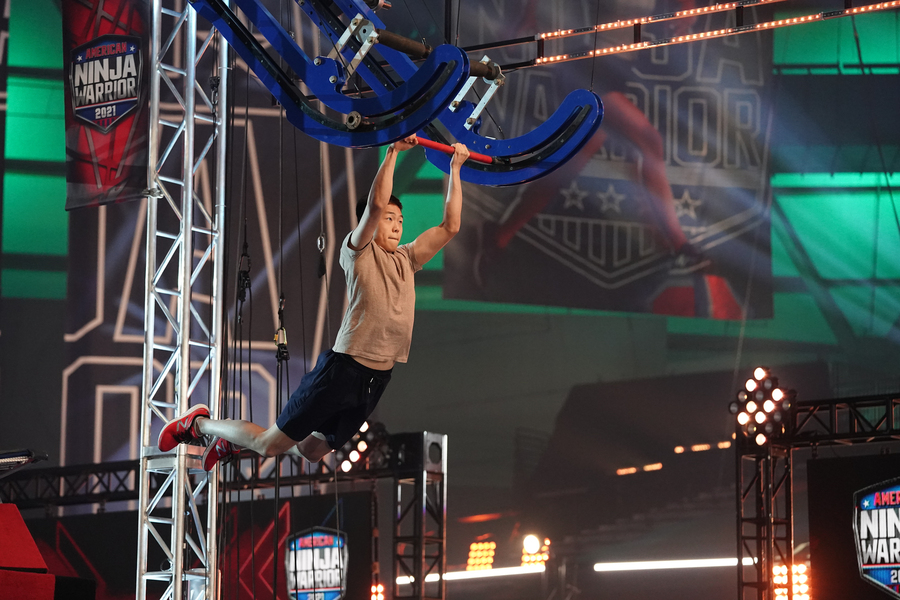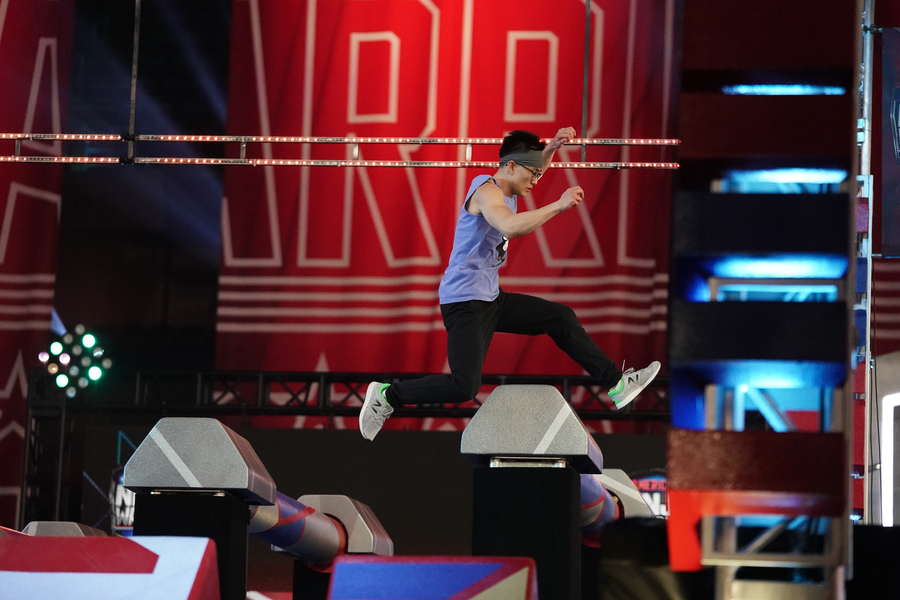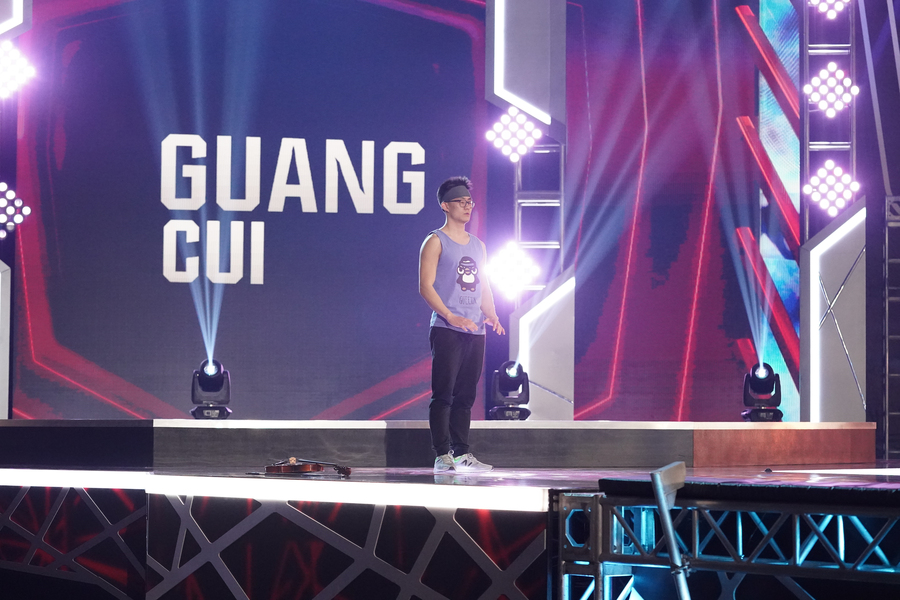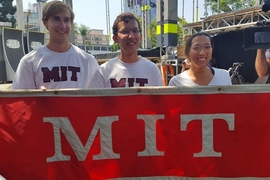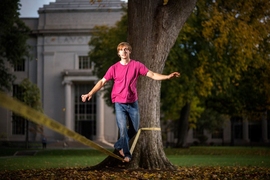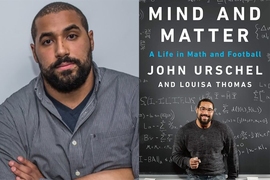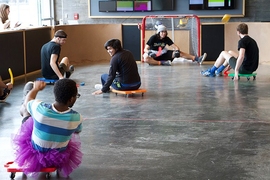Guang Cui and Daniel Sun are members of the class of 2022, course 6.3 (Computer Science and Engineering) majors, former roommates, best friends — and now, alumni of the long-running TV competition “American Ninja Warrior.” The episode in which they debuted (season 13, night 4 of qualifiers) as first-time competitors recently aired on NBC, and is available on several streaming services. They spoke recently about what it takes to be a ninja.
Q: How did you decide to try for this goal — were you both already fans of “American Ninja Warrior”?
Dan: Guang and I met in CPW [Campus Preview Weekend] and bonded almost immediately. We shared lots of things in common, and one of them was watching “American Ninja Warrior,” or ANW, since we were kids. When we met, we were both 18 and thought, “Wouldn’t it be cool if we tried to be on the show?” But the lower age limit to apply was 21. We spent our freshman year together in Chicago, participating in an internship at Akuna Capital. While we were there, we picked up bouldering as a pastime. A lot of the skills involved in bouldering are transferable to ANW, so when they lowered the age restriction for application from 21 to 18, we decided we should apply. We applied in 2019 for the 2020 season and were rejected, but we tried again the next year and ended up on the show.
Guang: Personally, I remember being about 5 years old, in the lobby of my apartment building, watching the original Japanese version of the show, “Sasuke.” We all watched ANW growing up, so when Dan and I met in freshman year and immediately had conversations about all the big-name ninjas and who we thought was the best, I knew we were going to be close.
Dan: My parents would always chastise me for climbing on things in the house, trying to do random tricks — a big one was doing pull-ups on door frames. My parents would always be upset, thinking I was going to break the door frames, but now I see that as me getting started with the training relatively early.
Guang: It was the same with me, though I don’t think I could do pull-ups on the door frames until high school. But I could do spider climbs on door frames starting when I was about 9 years old, and, like Dan’s, my parents would get mad at me.
Q: Athletic training during any Boston winter is hard — but it must have been doubly so during Covid. How did you stay safe while you trained?
Dan: During the early days we were both at home, and very early on we realized that there was really no way to safely go to the gym. The first thing I ordered was a pull-up bar so I could do exercises like calisthenics and body weight stuff. Trying to come up with exercises we could do was challenging.
Guang: At home, I also did a lot of calisthenics and other random exercises using makeshift materials. I made a random YouTube video of me working out and doing ninja stuff at home. Once we were allowed to attend socially distanced gyms, I went to the rock-climbing gym with my mask on. I got tested a lot in the late summer. We kept each other updated with training; I would text Dan the hard rock-climbing problems I encountered. In spring, when we got back onto campus, that’s when we got the surprise call that we would be on the show. After that, we would go to the ninja gym multiple times every week, as well as training in the Z Center. We would get a Zipcar and go to the ninja gyms out in Boston and Wellesley, train for two hours in the evening, then get home and rest. We blew through a thousand dollars in Zipcar costs … but it was absolutely worth it.
Q: What’s it like to go behind the scenes of the set — were there any surprises?
Dan: One memory that comes to mind is when we were on the buses to go to the actual competition. I didn’t know any of the ninjas that were there on my bus, and then this one guy in a hoodie and beanie, sipping tea, sits down next to me. He starts talking to the guy behind me about the obstacles, like, “What do you think we’re gonna have?” And I leaned in to join the conversation. As I’m introducing myself, the guy pulls back his hoodie — and it’s David Campbell, the “Godfather,” who has competed in literally every ANW competition. I’ve seen him in every season since I was a little kid. He gave me a bunch of advice for being in my rookie season. It’s surreal to see people you’ve just seen on TV, and I’ll say that I really like the people in the ninja community — they’re really friendly and open to talking, and they lead interesting lives.
Guang: I totally agree. Interacting with people whom we’ve seen as celebrities for so long is crazy. To realize that we’re running the same course is still wild to me. We were playing instruments in the office there, and [retired NFL player] Andrew East walked by and said, “You sound nice!” There are people from all walks of life who participate, and since we’re normally surrounded by other college students, it was great to have the opportunity to learn from them.
Q: When did you learn which challenges you’d be facing, and how did you mentally prepare? Emotionally?
Guang: You don’t learn the obstacles until the day of filming; it was like maybe an hour or two, max, before we ran the course. They took us through and told us the rules, and then we were just thinking about how to go through, engaging in mental visualization and strategizing.
The only exception to the surprises are the first and last obstacle, which are usually the same. The last obstacle is always the Warped Wall, so we’d practice that a lot. Recently, the first obstacle has been the wobble steps, followed a rope to the platform. I was weirdly really nervous about the first obstacle! The day before we had to leave for Seattle, I put five books in the hallway and strode across them just to prepare; Dan came out and laughed at me. I was being dumb, but it was good practice.
Q: Tell us about the actual, physical experience of going through the course.
Guang: I would say it obviously creates a lot of nerves, because you only get to do it once a year. I took a lot of deep breaths and tried to zone in, and live in the moment. Physically, I think my training helped a lot; I didn’t feel too tired after any one obstacle. It’s like riding a roller coaster but a lot better. In the moment, it’s just so fun — it’s like play.
Dan: I remember that backstage, in the warm-up area, there were these bars for infrastructure to hold up some posters, and the other ninjas were doing pull-ups and warmups on those bars. They’d set up some crash pads, so after we got a glimpse of the obstacles, we were trying to mimic them by swinging around on the support bars.
Q: Do you think being a scientist is beneficial to being a ninja — and if so, how?
Dan: There’s definitely things that carry over; the discipline and training it takes to be a ninja is very similar to discipline in studying. Like achieving anything in life, you have to put in the hours, effort, and training, to get to where you want to be. You have to eat healthy and work on your body in order to be at peak performance. Mental preparation translates well, too; we both did a lot of academic competitions back in high school, and a lot of that mindset translates. You have to be completely zoned in and focused on the question at hand in order to make progress on the problem. That “in the zone” feeling is very similar across both kinds of challenge.
Guang: One area where the experience doesn’t translate is when the announcers say things like “as scientists, you should be able to calculate the trajectory of the needed movement” … well, no. There are a few cases where knowing the physics of an obstacle can sort of help — for instance, knowing that if you spread your legs out, you have a greater chance of completing the obstacle. But the actual experience of being on the obstacle helps way more. I’m glad we had the opportunity to do this challenge that is totally different than either computer science or electrical engineering. It’s nice to play on obstacles when I’m burnt out from writing code. It balances my life.
Q: How has this experience changed you?
Dan: The first thing both of us said after it was over was, “We have to run it back next year; we’ll be back.” Surface-level, it was cool to learn about how TV is made. We realized a lot of things can be scripted or filmed hundreds of times until they get it right. Additionally, it was a great learning experience for figuring out how I act in high-pressure scenarios — “American Ninja Warrior” was by far the biggest stage I’ve ever been on, which is kind of bizarre because I feel like I have other strengths as well, and I would have expected to be showcasing those! It’s not that Ninja is my weakest side, exactly, but it was cool to be able to showcase that athletic side of myself on the biggest stage.
Guang: I learned a little about what I was capable of. If you’d asked me three years ago if I would be on the show, I would have been pretty surprised. As Dan said, we would have been less surprised if we’d done something remarkable in the sciences. I don’t think the experience fundamentally changed us as people; we had this one moment on TV. It’s just a neat moment in our lives. Also, Dan and I were best friends before ANW, but this experience has brought us even closer, which was really great.
Q: Do you plan to try to start a ninja community at MIT?
Guang: Actually, yes! We’ve been talking about trying to get a ANW club started, apply through MIT and maybe make it official soon.
